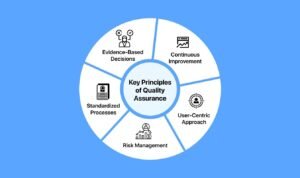Quality assurance parameters play a pivotal role in ensuring the success and reliability of products and services across various industries. In a world where customer satisfaction is paramount, businesses need to embrace and implement effective quality assurance measures to meet and exceed customer expectations. This article delves into the key aspects of quality assurance parameters, shedding light on their significance and how they contribute to the overall success of businesses.
The Essence of Quality Assurance Parameters
Quality assurance parameters refer to the set of criteria and standards established to guarantee the consistent delivery of highquality products or services. These parameters act as a compass, guiding businesses towards excellence by focusing on aspects such as functionality, reliability, and customer satisfaction.
In a rapidly evolving business landscape, where competition is fierce, adherence to quality assurance parameters becomes a strategic necessity. It ensures that a product or service not only meets industry standards but also stands out in terms of performance and customer experience.
Key Components of Quality Assurance Parameters
A. Functionality:
Examining the core functionality of a product or service is a fundamental aspect of quality assurance. This involves rigorous testing to ensure that the product performs its intended tasks flawlessly.
Parameters for functionality testing include usability, efficiency, and compatibility across different platforms.
B. Reliability:
Reliability is the backbone of any successful product or service. Quality assurance parameters for reliability focus on the product’s consistency and ability to perform under various conditions.
Testing procedures often include stress testing, performance testing, and durability assessments.
C. Security:
In an era of increasing cyber threats, security is a critical aspect of quality assurance. Parameters in this category involve assessing the robustness of a product or service against potential security breaches.
Regular security audits, penetration testing, and encryption protocols are common measures.
D. Scalability:
As businesses grow, so do their requirements. Quality assurance parameters for scalability ensure that a product or service can adapt to increased demands without compromising performance.
Load testing and scalability assessments help determine the system’s ability to handle growth.
Significance of Quality Assurance Parameters
A. Customer Satisfaction:
Meeting or exceeding quality assurance parameters directly translates to heightened customer satisfaction. Satisfied customers become loyal customers, contributing to longterm business success.
B. Reputation Management:
A commitment to quality assurance builds a positive reputation for a brand. A solid reputation, in turn, attracts more customers and strengthens relationships with existing ones.
C. Cost Savings:
Implementing quality assurance parameters from the outset can help identify and rectify issues early in the development process. This proactive approach minimizes the risk of costly recalls or product failures down the line.
Implementing Quality Assurance Parameters
A. Comprehensive Testing Protocols:
Establishing a robust testing framework is crucial. This includes unit testing, integration testing, and endtoend testing to cover all facets of product development.
B. Continuous Monitoring:
Quality assurance is an ongoing process. Implementing continuous monitoring mechanisms ensures that any deviations from established parameters are detected and addressed promptly.
C. Feedback Loops:
Incorporating feedback from endusers and stakeholders is essential. This iterative process helps refine quality assurance parameters over time, aligning them with changing market dynamics.
Conclusion:
Quality assurance parameters serve as the cornerstone of success in today’s competitive business environment. By embracing a comprehensive approach to quality, businesses can not only meet but exceed customer expectations, thereby securing a lasting and prosperous future. As industries continue to evolve, the mastery of quality assurance parameters will remain a key differentiator, setting apart the leaders from the followers in the global marketplace.visit stack360.

